
Self-care for
Families
On this page:
- Caring for your emotional, physical and mental health
- Tips from the Australian Psychological Society
- AllPlay Learn's simple self-care strategies
Practicing self-care is essential during this time—not just for children, but also for caregivers. Feelings of unease and worry are expected during a pandemic, but it’s important that we learn how to manage stress before it becomes more severe.

Caring for your emotional, physical and mental health
Much research shows that caregivers of children with disabilities and developmental challenges experience higher rates of stress. Family life with a child with a disability or developmental challenges can be emotional and challenging at times. Siblings of all ages may need support too.
Consider:
- Look for another perspective. For example, “I have so much on my plate, I can’t cope with this as well” could instead be, “I have a lot on my schedule right now, and maybe it might be helpful to re-examine my priorities and see how I can make space in my schedule for this, or if now is a good time to reach out for some support.”
- Focus on the strengths or positives. Actively looking for the things we like about our family, and about ourselves, can help increase positive thinking.
- Recognise thoughts as a product of the mind, not as reality. Sometimes stepping back and making space for our thoughts, with the perspective that they are just words and not necessarily true, can help.
If you feel overwhelmed and need immediate support, call your family doctor or contact:

Tips from the Australian Psychological Society
The Australian Psychological Society provides tips for coping with coronavirus anxiety and maintaining mental health during social isolation.
View the Australian Psychological society’s tips.

AllPlay Learn's simple self-care strategies
AllPlay Learn has also created an infographic outlining simple self-care strategies for parents.
Celebrate what you have achieved this week. Make a list of five accomplishments from the last week—they can be as simple as managing to make dinner for the kids!
Take a break when feeling overwhelmed. Set aside some time to relax with a book, bath, or cup of tea.
Identify your and your child’s strengths and work from there. Download our Character Strength’s poster and work through it together.
Combine tasks with your child’s interests where possible. This will help keep them engaged and allow you to relax.
Re-center with relaxation breathing or mindfulness. Watch Elsternwick Primary School’s relaxation breathing video for an idea of what you could do with the kids.

